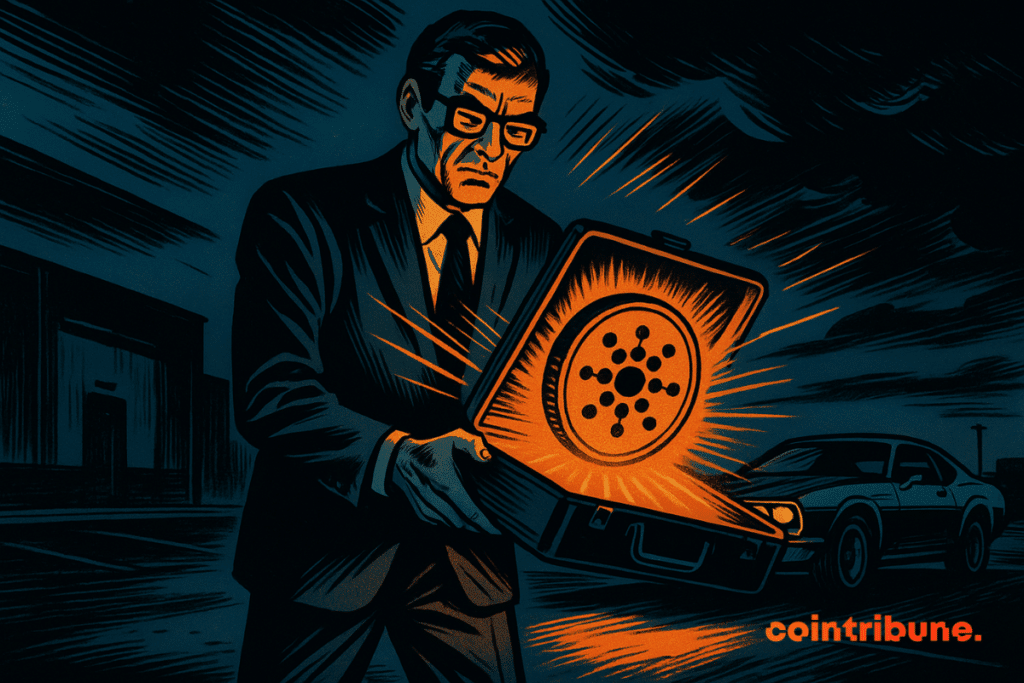Ford Tests The Cardano Blockchain To Revolutionize The Storage Of Legal Data
For several years now, blockchain has been sneaking in everywhere: automotive, healthcare, finance. Now, it is trying to establish itself at the very heart of legal procedures. This time, the movement comes from a partnership between Ford, Iagon, and Cloud Court, all united to test whether Cardano can become the technological foundation for decentralized and intelligent management of legal data. A proof of concept has been launched. The challenge? To combine security, compliance, and artificial intelligence in a field still dominated by heavy, costly, and fragmented systems.

In Brief
- Ford is involved as an advisor in a legal proof of concept based on Cardano.
- The project combines decentralized storage and artificial intelligence to analyze complex legal documents.
- Cardano records access metadata to ensure auditability, compliance, and data security.
- No promise of production, but a crucial test to build Cardano’s credibility with Fortune companies.
Ford Evaluates Cardano to Revolutionize Corporate Legal Management
The blockchain wants to revolutionize everything, from healthcare to legal, through energy and mobility. When a Fortune 50 company like Ford decides to explore its use for managing legal data, it sends a strong message. This involvement is low profile: the brand plays a strictly advisory role but brings its massive expertise in compliance, legal operations, and secure storage.
The proof of concept brings together Iagon, a decentralized storage specialist, and Cloud Court, a developer of legal tools powered by artificial intelligence. Data remains encrypted and stored off-chain; only metadata is anchored on Cardano to guarantee traceability. Added to this is the analysis of legal documents via AI trained to recognize depositions, minutes, and other sensitive records.
This hybrid architecture aims to provide a trust link for businesses. As Iagon writes in its release:
This project represents a major step forward not only for the legal industry but also for the Cardano ecosystem.
The interest is not only technical: by successfully passing this test, Cardano, issuer of the ADA crypto, could become the legal reference for highly regulated companies.
When Ford Tests the Legal Limits of Blockchain Without Getting Burned
Ford has not deployed capital nor set up a validator node. But the company wants to know if blockchain can outperform its current systems. Because today, even the largest legal teams are overwhelmed by mountains of documents. Between preparing witnesses, finding evidence, and reconciling versions, each case becomes an operational nightmare.
The official quote is clear:
Ford will evaluate the security and scalability of decentralized legal storage.
The company will also test the adequacy of blockchain-based traceabilities with its internal procedures.
It is also a way for Ford to verify if these infrastructures comply with standards such as GDPR or HIPAA without losing efficiency. On their side, Cardano developers see an opportunity to demonstrate that their network can adapt to regulated sectors—far from a simple crypto ecosystem.
This collaboration is not Ford’s first. In 2019, it partnered with IBM and LG Chem to trace the cobalt used in its batteries via blockchain. Today, it returns to familiar ground, but in a different universe: that of digital justice.
Cardano, Blockchain, and Legal Intelligence: Towards Broader Adoption?
This test is not just a simple technological exercise. It is a full-scale laboratory to test what blockchain can offer to the most conservative sectors.
- 70% of large legal firms still work with siloed, poorly interoperable systems;
- Legal data breaches have cost more than 100 million dollars in the United States in 2023;
- Cardano already hosts projects in healthcare, education, and now, law;
- Cloud Court claims an AI capable of reducing hearing preparation time by 40%;
For project stakeholders, success could open the door to other sectors: insurance, governments, healthcare. Blockchain, with its transparency and lack of trusted third parties, offers a viable alternative to costly and fragile centralized servers.
Cardano developers openly state their ambitions: “This initiative demonstrates that decentralized infrastructure can meet the requirements of regulated industries.” The message is clear: they want this Proof-of-Concept (PoC) to serve as a replicable model.
Besides all of this, Ford is not one of those firms Michael Saylor would like to see inject bitcoin into their treasury. Yet, in September 2022, the company filed a series of trademarks related to the metaverse. It is through this trapdoor that the automaker entered Web3. The legal project with Cardano today shows another side of this transformation. The quieter one, of a turn toward infrastructure and concrete use cases.
Maximize your Cointribune experience with our "Read to Earn" program! For every article you read, earn points and access exclusive rewards. Sign up now and start earning benefits.
La révolution blockchain et crypto est en marche ! Et le jour où les impacts se feront ressentir sur l’économie la plus vulnérable de ce Monde, contre toute espérance, je dirai que j’y étais pour quelque chose
The views, thoughts, and opinions expressed in this article belong solely to the author, and should not be taken as investment advice. Do your own research before taking any investment decisions.